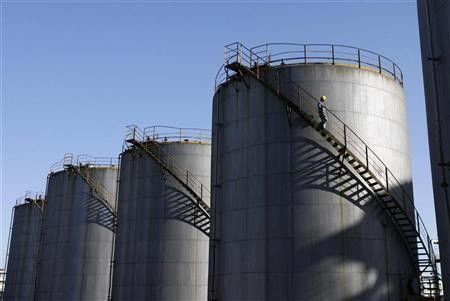Libya's NOC seeks $6bln in sanctions debts

Libya's top oil body is pursuing international oil firms for bills worth around $6 billion that were left unpaid this year due to U.N. sanctions imposed in March, a source in the National Oil Corporation (NOC) told Reuters this week.
Negotiations to recoup the unpaid money will put to the test relations between the OPEC member country and its partners from the period of Muammar Gaddafi's rule, who are now seeking to rebuild ties with the new administration.
The outcome of the negotiations will also give an indication of the previously all-powerful NOC's authority in the new Libya as rival bodies vie for control of its economic lifeline.
We are starting to make arrangements for them to repay this money. It is more than $6 billion. They may be able to give us oil products, said a senior source in the NOC who declined to give his name.
Libyan officials have shown a willingness to honour previous production agreements but with oil now trickling onto international markets, it remains to be seen if old contracts will stand in the trading arena.
Billions of dollars in oil payments were blocked in March when the United Nations introduced sanctions on the NOC after Gaddafi launched a violent crackdown on protesters.
The NOC source said the list of debtors included U.S. oil majors ConocoPhillips and Exxon Mobil Corp, British major BP, Austrian energy group OMV, trading firm Vitol and Italian oil firms Eni and Saras.
Exxon said on Wednesday it will settle any outstanding debts with Libya.
While some firms took early action and stopped dealing with the NOC as early as February or March, others made the most of what was effectively free oil by taking advantage of NOC payments terms that typically allow a 30-day window for money transfers, trading sources said.
The uncertainty of the political situation earlier this year, when violent clashes were raging, made it unclear if or when they would have to pay the money back to Libya.
Reuters calculations showed that Libyan oil exports for March alone were worth a nominal $4.5 billion, based on the price of benchmark Brent crude, indicating that the NOC figure is likely to be a realistic estimate of lost revenues.
Saras, Eni, Vitol and OMV declined to comment.
BP and Exxon said they have complied with all international sanctions while Conoco was not available for comment.
Industry sources with knowledge of the matter said they expected the money would be paid once better ties have been established with the new Libyan authorities.
NEGOTIATIONS
Two oil traders working for firms listed above confirmed that money was owed to the NOC and both said their companies planned to repay it.
There is no benefit for us dragging our heels and we already have the money in a segregated account with interest but maybe other players won't be as prepared, one of the traders said.
Any big, unexpected pay-out could hit trading profits in the fourth quarter at a time when falling oil prices and uncertainty about economic growth are already creating a challenging trading environment.
One sticking point for the negotiations between the cash-strapped Libyan authorities and international firms could be interest payments. A Libyan oil industry source said that no agreement has yet been reached on this point.
Oil industry sources said that any attempt by companies to stall payments, or refuse to pay interest on payments, would damage future relations with the NOC and commercial prospects in the post-Gaddafi era.
If people are scrambling to get in their good books, it wouldn't make sense for them to play games, the trader said.
Libya also owes money to some oil firms for fuel imports delivered to rebels this summer. Benghazi-based oil firm Agoco has promised to give half its early crude oil production to trading firm Vitol as repayment for a $1 billion fuel debt.
NOC BACK IN DRIVING SEAT
NOC's efforts to recoup the unpaid money will be one of its first major tasks as it seeks to assert authority.
Headed by oil industry veteran Nouri Berouin, it was effectively paralysed for months because of the sanctions, and had to delegate power to its Benghazi-based subsidiary Agoco in order for marketing to continue.
The U.N. voted to ease sanctions in mid-September and Libyan trade is beginning to pick up with even U.S. oil firms now starting to trade Libyan oil.
The NOC plans to resume marketing within the next month, although some subsidiaries have expressed resistance to the idea of an all-powerful NOC.
The future division of responsibilities between the NOC and and the oil and finance ministry, headed by Ali Tarhouni, is unclear. Earlier plans to form a separate oil ministry for shaping policy appear to be floundering.
The head of the interim National Transitional Council said on Monday that oil issues will return to the national oil authority when it becomes active in a period less than a week, in what appeared to be a reference to the NOC.
© Copyright Thomson Reuters 2024. All rights reserved.





















